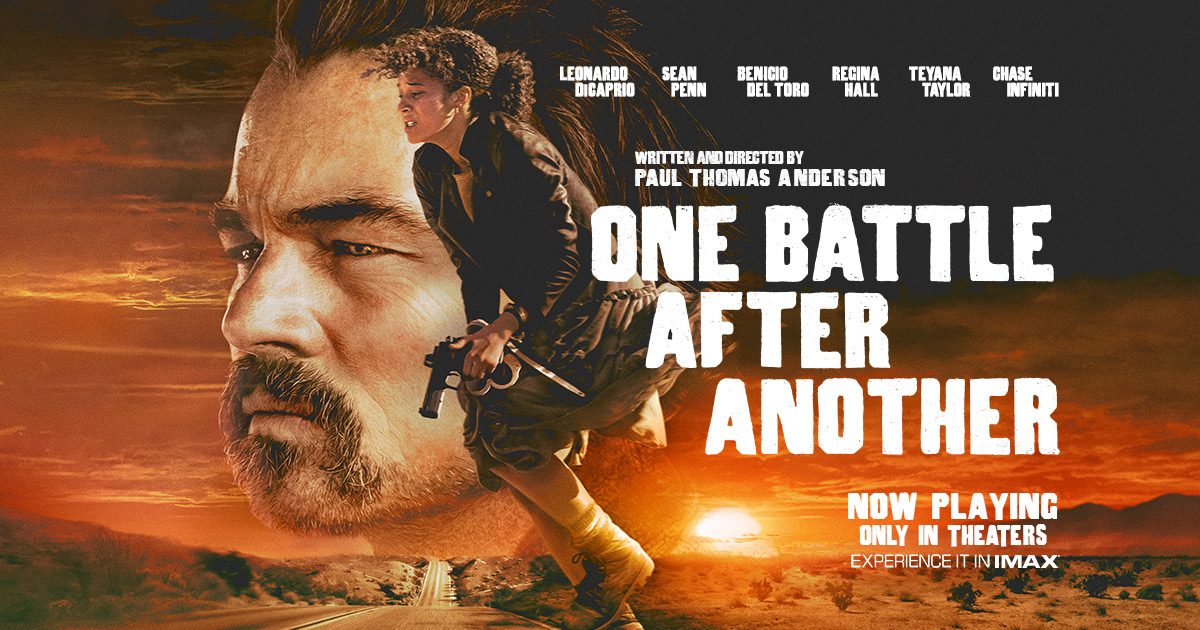One Battle After Another ~ Review
By: [email protected] on

Paul Thomas Anderson is a filmmaker I respect more than I actually love. I love that he’s one of the few writer/directors who can command a large budget, make any project he wants, and do so without any interference. He’s never stepped into the studio franchise machine and follows his own muse, and that is rare these days. I also love that he makes these intricate, sprawling, inherently cinematic movies that are spectacles in and of themselves, but aren’t beholden to genre conventions or norms. All of that makes him rightly one of his generation's most celebrated filmmakers. However, with the lone exception of Boogie Nights, almost all of Anderson’s films have left me cold. There’s a remove with his films that keeps me from getting fully invested in them, and One Battle After Another is another example of this. Make no mistake, it is a gorgeous movie that is exceptionally well-acted, directed, and shot, but it just didn't grab me. It's not you, PTA, it’s me.
Light spoilers ahead. Pat Calhoun (Leonardo DiCaprio) and Perfida Beverly Hills (Teyana Taylor) are members of the radical far-left revolutionary group known as the French 75. This group smuggles immigrants out of detention centers or blows up power stations and courthouses. Think the Weather Underground on steroids. During one raid on an immigration center, Perfida runs afoul of the racist Colonel Steven J. Lockjaw (Sean Penn). Lockjaw develops an all-consuming psycho-sexual obsession with Perfida, and even confronts her during a job. Lockjaw allows Perfida to continue her activities only if she meets him at a motel for a sexual tryst. Eventually, Perfida gives birth to a baby girl, Charlene, but a combination of post-partum depression and a desire to continue the revolution causes Perfida to leave Pat and the baby behind. A bank robbery goes wrong, Perfidia is caught, and gives up the other members of the French 75 to the authorities. This causes Pat and his daughter to go into hiding taking on new names Bob and Willa.
Sixteen years pass, and Pat (under the identity of Bob) is now a paranoid alcoholic and stoner desperately trying to protect his now teenage Willa (Chase Infiniti) from the eventual return of Lockjaw. And what is ole’ Lockjaw up to? Well, he’s being recruited by a secret white supremacist group that works within the United States government called the Christmas Adventurers Club. It appears that Lockjaw’s past with Perfida just might be a problem for his admission to this secret group, and now he’s on the hunt for Pat and Willa. Can Pat use what is left of his fried brain to save Willa? If only he could remember the secret codewords that would get him to safety...
DiCaprio is hilarious as the constantly befuddled and hapless Pat, particularly in a stretch of the film where he’s assisted by Willa’s karate sensei, Sergio St. Carlos (Benicio Del Toro). Del Toro is a real highlight here as well, giving a funny and warmhearted performance. Sean Penn is fantastic as Lockjaw, playing a guy who is barely keeping his rage in check. Penn gives Lockjaw these strange tics, constantly biting his upper lip and twitching his eyes, which is alternatively hilarious and terrifying. The real heart and soul of the film, however, is Chase Infiniti, who steals every scene she’s in with humor and heart.
It shouldn’t surprise anyone that Anderson’s action scenes are beautifully composed. There’s a car chase late in the film where the cars zoom over hilly roads and the camera glides along with the vehicles. It’s exhilarating.
One Battle After Another is dense. Every frame is crammed full with character and impact; the plot meanders, but the story is actually pretty easy to describe – the film is Paul Thomas Anderson’s Commando. Except instead of Arnold Schwarzenegger trying to rescue his daughter, it’s the Dude from The Big Lebowski. Which, I can get behind as a concept, but the problem is that, as with Anderson’s other densely populated films, it kept me at a remove and never fully pulled me in. There’s so much going on that I just felt lost in the world of the film. I think this is actually by design, since the film is based on Thomas Pynchon’s novel Vineland, and “dense” might be an understatement when describing Pynchon’s books.
Like many of Anderson’s films, I think you have to go with the flow and the feeling of the piece. Don’t sweat all the little details. Unfortunately, my brain can’t always just go along for the ride, so I found myself enjoying One Battle After Another but not really loving it.
Three out of Four Stars
 WhoRepresents.com is safe & secure
WhoRepresents.com is safe & secure